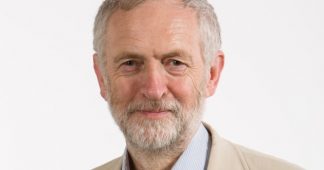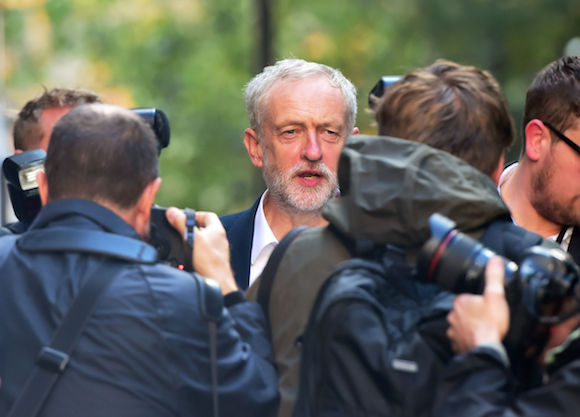By Kate Hudson
Jeremy Corbyn’s re-election to the leadership of the Labour Party on an increased vote is a significant victory for the left in the Labour Party and for progressive politics in Britain. It is a victory that everyone on the left celebrates. It demonstrates the strength of support that exists for changing the politics of the Labour Party: for shifting the balance of power within our society, away from the political and economic elites towards the majority, to empower and enfranchise the working class and communities hardest hit by the long run attacks upon the welfare state.
It is absolutely clear that Corbyn seeks to bring significant change to the Labour Party: to restore its foundational commitment to the interests and advancement of the working class, to defend and extend its greatest achievement – the welfare state, and to make headway where previously there has been little progress – in making Labour a champion of international peace and justice, against British economic interventionism, war and nuclear weapons. All those who seek advance for this agenda wish to support Corbyn and his allies in bringing change to the Labour Party so it can implement some, or all, of these policies.
The influx of new members into the Labour Party to support Corbyn’s political vision has been remarkable. Yet obstacles to the implementation of extensive change in the Labour Party are considerable, as has been seen over the last year. Both the British establishment and its counterparts within the Labour Party have fought to undermine Corbyn and remove him from office. This has failed but the strength of the right in the party’s apparatus and structures has obstructed much of the work he would wish to do. But there are also a number of other historical and political factors which militate against the kind of extensive change that some on the far left would wish to see.
The Labour Party has always been a broad church politically, never predominantly the preserve of the left. As Corbyn demonstrated in his speech at the recent Labour Party conference, uniting the party means political pledges which are acceptable to the overwhelming majority of the party – progressive, but very much in the Labour tradition. These include supporting the NHS, introducing a National Education Service, investing in jobs and homes, and restoring workers’ rights and some elements of public ownership. All these are excellent commitments and the restoration of the Labour Party to this political programme is very much to be welcomed.
Policies supported by Jeremy Corbyn and the left that are not tolerated by the right, such as anti-war, anti-Trident, anti-NATO have been sidelined or rejected, in line with Labour policies throughout most of its existence. Attlee, whose government introduced the welfare state, also helped found NATO and committed Britain to nuclear weapons, and there are those in the Corbyn leadership, as well as in the trade unions, the PLP and across the membership who either genuinely support this perspective, or condone it in order to achieve change on more ‘mainstream’ issues like rail re-nationalisation . Other issues are also highly contested and structural obstacles exist to progressive change – such as the rule change voted at the recent conference, preventing Labour councillors from voting against cuts budgets thereby allowing the situation to continue where many working class people and communities see Labour as part of the problem rather than part of the solution.
So the question facing Labour is not whether it can become an anti-capitalist party of the radical left. That is not within the framework of what is politically possible. Political intervention from the far left with that in mind will damage Corbyn’s prospects for achieving change within the Labour Party. The question is whether his leadership can succeed in recovering Labour for a social democratic reform agenda. Such a development would be unprecedented and of enormous political significance, across Europe and beyond, potentially impacting on other similar parties across Europe – the SDP in Germany, the Socialist Party in France.
Since the 1990s, all nominally social democratic parties have embraced neo-liberalism. Blair consolidated that process in Britain as Jospin did in France and Schroeder did in Germany and countless others elsewhere. Nowhere has this political process yet been reversed. The possibility exists in Britain because, owing to the first past the post electoral system, no numerically significant radical left party has emerged to present an anti-neo-liberal alternative the like of which we have seen across Europe and elsewhere globally. Thus Corbyn has been the recipient of much of the anti-establishment, anti-neo-liberal sentiment which has brought significant electoral support to parties like Podemos and Syriza. If Corbyn can harness this desire for change to restore social democracy to the Labour Party that will be an enormous advance for the people of Britain, with a potential impact on mass social democratic parties beyond our national boundaries. The social democratic space in British politics needs to be occupied once again by a mass party capable of government.
Many on the left have opted to join the Labour Party in order to support this development. Others take the view that in addition to the struggle to restore the Labour Party to its original remit and ethos, it is also crucial for an alternative left politics to be expressed – anti-capitalist and anti-imperialist – as it has been in politics in Britain and globally, for a century or more. The purpose of this is not just to set out the extent of what is possible and necessary for a real transformation of society and human, economic and social relations, but to be able to pursue in practical terms the politics that this vision represents. This political space, to the left of social democracy, also needs to be occupied – in Britain, as it is across Europe and beyond. Left Unity is part of that radical left current, with parties and movements across Europe, acting in solidarity and recognising that the problems we face in Britain cannot be solved on a national basis. They are systemic problems that the working class internationally is organising against and we are part of that process.
The hopes and dreams of so many of those who support Corbyn – and many more across society who don’t articulate their aspirations in party political terms – can only ultimately be fulfilled by a radical transformation of society, where democracy is not just a political process but an economic process in which the people must be supreme. We want to see the investment and reform programme which Corbyn proposes to improve people’s lives, but we also recognise that capitalism is fundamentally anti-people and our interests cannot be reconciled with the interests of capital. A clear political expression of anti-capitalist principles and policies is an essential part of the political spectrum – a small part no doubt in Britain – but the experience of the last two centuries shows this political analysis to be correct and to be widely supported internationally.
As too is our opposition to imperialism and our critique of British foreign policy and the tools it uses to retain its global position whatever the suffering it inflicts. A clear voice against war and nuclear weapons has never been more necessary, for Britain to play a different kind of role in the world based on justice and equality between states, not perpetuating neo-colonialism. Such a voice is necessary against racism and discrimination, for migrants, refugees and free movement, for the rights not only of workers from all countries, but of women and girls, of disabled people and all those suffering as a result of the brutal policies inflicted by ruling classes here and internationally.
Above all, our position is not just about stating the case for an alternative, it is about taking action, working wherever we can in our communities, with our class within and beyond our national boundaries, against austerity, against the sanctions, against the racist attacks and discrimination. There are diverse ways of contributing to the struggle for a just and equal society and this is ours.











